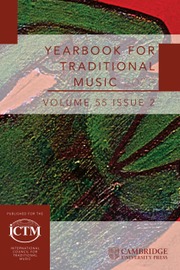Article contents
Making Culture Coherent: Nomadism, “Open Agenda” and Music in Wichi Society
Published online by Cambridge University Press: 07 March 2019
Extract
This work is an attempt to find relations between ecological conditions, adaptive systems and musical practices. I examine the hypothesis that the Wichi aborigines of the centre of the Province of Formosa, Argentina, have adopted a common policy to handle their survival resources, their symbolic resources and their musical resources. The aim is to gather evidence to support the notion that policies applying to several aspects of Wichi life, such as everyday subsistence chores, mobility, religious activities, and so on, also apply to their musical practices. They use an active strategy to approach and solve situations on the spot, a predisposition to base their behaviour on an open agenda. At the level of their musical practices, such strategy becomes evident both in the succession of actions conforming the events, and in the structuring of their songs. This open agenda strategy became, while I stayed in the Wichi settlements, one of the clearest conditionings of the ethnographic experience. On one hand, my anxiety to minimise uncertainty and “maximise” the field work yield led me to seek, with little success, a predictable working context in terms of planned actions and temporal organisation. This clashed head on with the attitude of my Wichi collaborators. On the other hand, though the levels of anxiety decreased after a year's experience, the problem persisted now in the form of a number of questions that became more and more important as my research progressed. Gradually, the upset caused by the impossibility to control the time of the appointed interviews, and of knowing whether next morning the person I was to see to, for instance, tape the songs he/she remembered from youth, was still in the settlement or had ‘up and gone’ several miles away to visit some relative, gave way to a series of questions. How pervasive was this open agenda strategy in the Wichi world? Were musical practices also imprinted by this strategy? Could this explain the cultural coherence of the Wichi society? Finally, was it possible to imagine and/or understand human groups in terms of cultural coherence? In an attempt to answer these questions, I examine the concept of cultural coherence, provide a brief description of the Wichi ecological conditions and adaptive system, and then explain their open agenda strategy and how it also applies to some musical practices.
- Type
- Articles
- Information
- Copyright
- Copyright © 2002 By The International Council for Traditional Music
Footnotes
This paper is a more detailed version of my presentation at the 36th ICTM World Conference held in Rio de Janeiro, 4-11 July 2001. It was originally called “Making culture coherent. Nomadism, contingency and music in Wichi society”. My heartfelt thanks to Irma Ruiz, from the University of Buenos Aires, for her helpful comments.
References
References Cited
- 1
- Cited by




